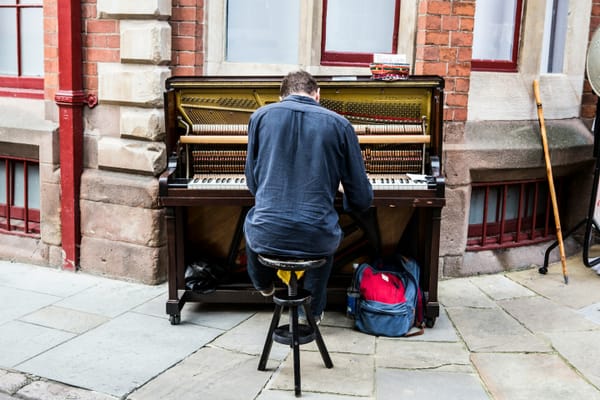O'Leary
If today was an acrylic painting, a wash of sky blue has seemingly been applied by roller, dominating the canvas, whilst bold russets and browns of rust and corrosion have been smeared on the canvas with deft daubs of a palette knife. There is an incessant caw from a pair of petulant crows on the roof ridge, but old man O’Leary barely notices. With his fencing pliers he twitches the last strand of barbed wire to a strainer post. A shorthorn bull had knocked down a section of fence overnight in an agitated rush to get at the milking cow in the house paddock. A lifetime on the land has taught him to always expect the unexpected. He could do this blindfolded, and menial tasks invariably offer him the opportunity to reflect on his life.
Joe O’Leary had arrived in the Dalmorton and Newton Boyd area as a seventeen year old jackaroo in the 1920s. Following the Cobb and Co stagecoach track down the old Gwydir Highway from Glen Innes on his grey mare, he’d found work at first on a property near the old Newton Boyd coaching station before gravitating further down the Boyd River. Past the hand carved tunnel built in the 1880s, he found work on a larger property near Dalmorton. He was a wiry youth, eager to learn, and in thrall of the stories told around the campfire.
McLennan, one of the older horsemen and a long-timer in this remote area, had mentioned that when he was a child, the outlaw Thunderbolt had crossed their property on horseback. Thunderbolt had been courteous to the mother and raised his hat to her before asking for a few provisions. Aware of Thunderbolt’s reputation, McLennan’s mother had obliged with a small portion of cooked beef. Once again, he was eternally grateful, and raised his hat before cantering away from the open and into the seclusion of the forest.
The youthful O’Leary was restless and keen to work his own land. On several occasions around evening fires, McLennan had mentioned the remote area of Cunglebung, an abandoned site of a former gold mining area in the 1860s. The property, Cunglebung Station, had recently been split up into several holdings and leases. Armed with references attesting to his good character and work ethos, the young jackaroo undertook an arduous week-long ride to Grafton where he visited the Commercial Banking Company. Before the age of twenty five, the jackaroo Joe O’Leary had become a mortgaged property owner in a very remote part of rural NSW. He would be 10 miles from his nearest neighbour and 13 miles from the nearest roadway leading to the miniscule village of Dalmorton.
For the greater part of the twentieth century, O’Leary’s home had evolved and grown as circumstances dictated. From a humble wood slab shack, sufficient for the needs of one man, it had imperceptibly morphed into a larger slab cottage, then a corrugated-iron dwelling. He’d never felt the need to apply a coat of paint; the patterns and multiple hues of rust contrasted pleasingly to his eye as it overlayed the monotone of grey iron. Similarly, he wasn’t offended by a lack of symmetry. Walls had leans, the roof had dips and hollows. He’d never needed to seek the approval of neighbours, there were none.
The ‘homestead’ had accommodated his wife and his son. He’d met Clara Turnbull on a cattle buying trip to OBX Creek. She was the 18 year old daughter of a cattleman on the OBX property. She could saddle and straddle a horse, knew how to muster cattle, and could work dogs. What more should he ask for in a wife? When their only child, Bernard, was six years old, Clara was tragically kicked in the head by a bay mare which she was shoeing, and died on the back of the farm dray transporting her comatose and broken body to Dalmorton. For the next fourteen years, Joe invested his time and knowledge in his son. There was little time to grieve, there was a property to manage.
The endless cycle of raising cattle ensured that Joe’s son became an expert horseman. He mustered, weaned, branded, drenched, de-horned and castrated calves alongside Joe by day and gave lip service to his packets of school tasks from the Sydney Correspondence School at nights. By the age of 13, Bernard quit the lessons altogether, believing that life in the bush was a university itself. His teenage years were seemingly happy and agreeable and he rarely clashed with his father.
It was the scrawled note Joe found on the dining table, after riding back from Dalmorton, that kicked Joe in the guts. Sucking for air, his heart squeezing through a wringer, Joe scrambled frantically through the home, searching, searching. It was in the tin outhouse behind the living area that Joe found Bernard’s body crumpled on the dunny floor with a bullet hole and congealed blood under his chin. Joe’s bolt action .22 rifle lay discarded beside him, spent case still in the chamber. “No! No! My son, my poor boy!” sobbed Joe, cradling his lifeless head in his lap. “Why? Why didn’t you say something?”
There are hundreds of abandoned mine shafts around the old gold mining areas of Buccarumbi and Dalmorton. They’re a hazard for grazing cattle and native wildlife, and rumour has it that some of them could house victims of historic crimes. Even today, the location of many of the shafts is unknown. The morning after discovering his body, Joe O’Leary, widower and now grieving father, committed his son to his eternal rest 50 feet down a concealed shaft a mile from his home. A fortnight later, in the village of Dalmorton, Joe strategically mentioned at the post office that Bernard had left the district and gone off shearing and fencing. Said he’d had an offer of work somewhere along the Castlereagh, just like the son in Banjo Paterson’s poem. The Postal Officer commented that the poet certainly understood the restlessness of young’uns raised in the bush.
Twitching the last strand of barbed wire, Joe is snapped from silent reverie to the present by the raucous caws of the two crows. They lift off from the rusty ridge of his roof and become specks of glistening black against the wash of blue sky. If only Bernard had gone droving Conroy’s sheep along the Castlereagh almost fifty years ago. If only… if only…
If he peeled away the layers of additions and modifications, like the petals of an onion, O’Leary knew there was nothing left inside his home, no core, no heart. Life had played out that way. It wasn’t through choice, it was just the way the cards fell.


